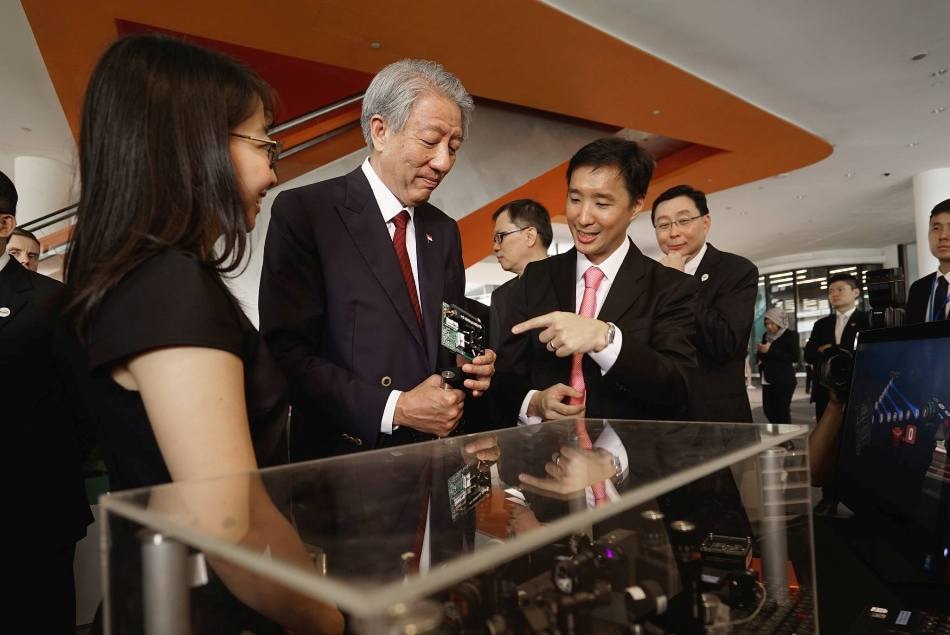Oct 26 2016
CQT researchers join the NUS-Singtel Cyber Security Research and Development Laboratory to develop quantum key distribution for Singtel's fibre network
 CQT's Alexander Ling and Singtel's Amelia Tan presented a demonstration of quantum key distribution to Singapore Deputy Prime Minister Mr Teo Chee Hean and other guests at the launch of the NUS-Singtel Cyber Security Research and Development Laboratory. (Credit: Center for Quantum Technologies)
CQT's Alexander Ling and Singtel's Amelia Tan presented a demonstration of quantum key distribution to Singapore Deputy Prime Minister Mr Teo Chee Hean and other guests at the launch of the NUS-Singtel Cyber Security Research and Development Laboratory. (Credit: Center for Quantum Technologies)
The National University of Singapore (NUS) and Asia's leading communications group Singtel have come together to establish the NUS-Singtel Cyber Security Research and Development Laboratory. Researchers from the Centre for Quantum Technologies (CQT) are part of the lab, committing to develop quantum key distribution (QKD) for Singtel's fibre network.
Launched on 24 October under the National Research Foundation's Corporate Laboratory@University scheme, the joint research venture aims to develop novel data analytic techniques to detect and respond to security attacks and to come up with new approaches to IT systems that are 'secure by design'. The lab is funded with $42.8 million over five years.
A global footprint
Mr Bill Chang, Chief Executive Officer, Group Enterprise at Singtel said, "Many enterprises are constantly challenged by the fast-evolving and increasingly sophisticated nature of cyber threats. Our collaboration with NUS and NRF will enhance our ability to protect enterprises and governments by developing next-generation cyber security technologies and solutions which we can quickly commercialise through our global footprint of product engineering and development centres. We also aim to attract top global talent to the Lab to groom cyber R&D professionals, and position Singapore as a strategic R&D hub for our global cyber security business.”
Guest-of-honour for the official launch was Mr Teo Chee Hean, Singapore Deputy Prime Minister and Coordinating Minister for National Security, and Chairman of NRF Singapore.
"Quantum technologies will play a vital role in the future secure communication. Over the last decade, researchers at CQT have developed extraordinary insight into the quantum world and its potential commercial applications. We are happy to work with Singtel to explore these possibilities," said Artur Ekert, CQT's Director and NUS Lee Kong Chian Centennial Professor.
Future-ready security
QKD is a technology to automatically create symmetric encryption keys between a sender and receiver, in a way that reveals in real-time any attempt at tampering. It relies on creating, sending and detecting light particles one by one. Some first-generation QKD systems are already available commercially. CQT will work with Singtel to develop a second-generation technology that uses correlations in pairs of light particles to create an encryption key, demonstrating it over Singtel's fibre.
The corporate lab has four research themes. The work on QKD will be led by CQT Principal Investigators Alexander Ling, Christian Kurtsiefer and Valerio Scarani with CQT and Singtel colleagues, under the theme "Future-Ready Cyber Security Systems".
"CQT has very mature QKD technologies, and by partnering with Singtel which has widespread networks, we will be able to bring communications security to a new level. The newly established Corp Lab is also beneficial for our students who will gain a new perspective about transitioning between academia and industry," says Alexander.
The corporate lab, led by David Rosenblum, Provost's Chair Professsor in the Department of Computer Science at NUS School of Computing, will host the activities of more than 100 research staff from NUS and Singtel over five years. The laboratory also expects to train some 120 new cyber security professionals from undergraduate to postdoctoral level.
Source: http://www.quantumlah.org/